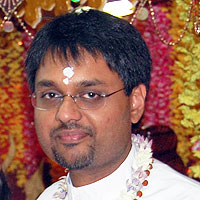The annual celebration of Gita Jayanti is a constant reminder to all of humanity, regardless of creed or race, of the universal lessons of the Bhagavad Gita as espoused by Shri Krishna to his dear disciple Arjuna. Many of these lessons have found favour with world-renowned figures who found solutions to their many challenges and deep solace. Still unread by many in the western world the Bhagavad Gita has nonetheless influenced the minds of great philosophers and activists who have shared the wisdom of it in their great works.
Mohandas Gandhi proclaimed the sublime power of this text and the profound effect it wielded over his life. It was a prime source of inspiration for him. This text has been highly praised not only by Gandhiji and Jawaharlal Nehru, the first Prime Minister of independent India, but also by prominent figures of the western world, who have contributed much to world thought and development. Outlined below are the reflections of a few of them on the power of this text that is just over five thousand years old.
- Gandhiji: “Hinduism as I know it entirely satisfies my soul, fills my whole being. When doubts haunt me, when disappointments stare me in the face and when I see not one ray of light on the horizon, I turn to the Bhagavad Gita and find a verse to comfort me; and I immediately begin to smile in the midst of overwhelming sorrow. My life has been full of tragedies and if they have not left any visible and indelible effect on me, I owe it to the teachings of the Bhagavad Gita.” (Young India: June 8, 1925).
- Jawaharlal Nehru: “The Bhagavad-Gita deals essentially with the spiritual foundation of human existence. It is a call of action to meet the obligations and duties of life; yet keeping in view the spiritual nature and grander purpose of the universe.
- Henry David Thoreau: “In the morning I bathe my intellect in the stupendous and cosmogonal philosophy of the Bhagavad-Gita, in comparison with which our modern world and its literature seems puny and trivial.”
- Ralph Waldo Emerson: “I owed a magnificent day to the Bhagavad-gita. It was the first of books; it was as if an empire spoke to us, nothing small or unworthy, but large, serene, consistent, the voice of an old intelligence which in another age and climate had pondered and thus disposed of the same questions which exercise us”.
- Aldous Huxley: “The Bhagavad-Gita is the most systematic statement of spiritual evolution of endowing value to mankind. It is one of the most clear and comprehensive summaries of perennial philosophy ever revealed; hence its enduring value is subject not only to India but to all of humanity.”
- Adi Shankara: “From a clear knowledge of the Bhagavad-Gita all the goals of human existence become fulfilled. Bhagavad-Gita is the manifest quintessence of all the teachings of the Vedic scriptures.”
Many have come and gone, yet the lessons embedded within the pages of the Gita remain eternal and refreshing. It is instructive to note that the very first syllable is ‘dha’, the last at the end of the text is ‘ma’. Put together, the word ‘dharma’ (duty) is formed, an indication of the route to be taken in order to be within reach of the Divine. As we all celebrate the auspicious occasion of Gita Jayanti, it is hoped that the study of the Gita would help in discovering one’s true nature through the path of dharma.


